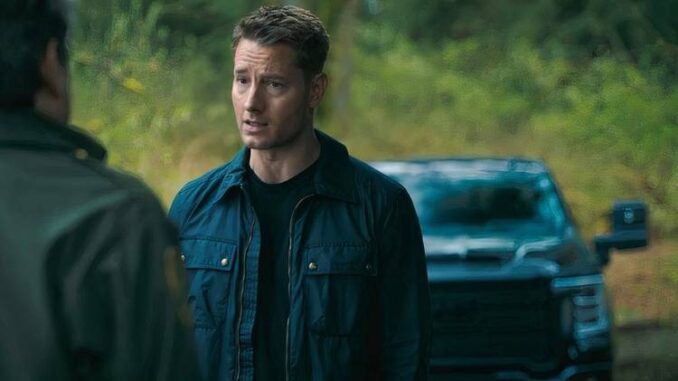
When speaking with Men’s Journal, Justin Hartley talked about the success of Tracker. While he points out in the interview that Tracker is a procedural that allows the main character to grow over time, even if the story is not heavily serialized, he also believes Colter’s distinct type of masculinity provides success.
Hartley describes Colter Shaw as someone who “doesn’t apologize for his masculinity,” but also as someone who “is all about talking with people.” He told the magazine: One of the things I really love about Colter and the way we’ve built him is that he doesn’t apologize for his masculinity. I think that’s what people are looking for. You’re asking yourself, ‘What kind of people do I want to hang out with?’ And particularly: ‘What kind of male friends do I have in my life that I really value?’ I think we’ve crafted a character that is so emotionally evolved, and he really does want to get to the root of why people do things… He’s a man through and through. And that doesn’t mean you have to be the loudest person in the room and know every single thing and throw tables around and scream and shout and yell and smoke and drink.
He’s all about talking with people. Reading people. Understanding them. He’s an all-encompassing man. He’s not just a guy. He’s a man. Hartley’s assessment of Colter is accurate. Though Colter might be able to handle himself in a fight and survive in harsh climates on his own, he is relatively soft-spoken, willing to listen to those around him, and willing to understand points of view that are not his own. Those are not traits seen in many hyper-masculine action heroes.
Justin Hartley, best known for emotionally resonant roles like Kevin Pearson in This Is Us, has taken on a different beast in CBS’s hit show Tracker. As Colter Shaw, a lone-wolf survivalist who tracks missing persons for reward money, Hartley might seem like the archetypal rugged hero. But here’s the twist: the show’s breakout success isn’t just about grit or high-stakes action—it’s about healthy masculinity. Let’s break that down, explore what makes Colter tick, and why Tracker has struck such a powerful chord with viewers in a landscape flooded with procedural dramas.
Who Is Colter Shaw?
The Man Behind the Mission
Colter Shaw isn’t your average TV tough guy. Sure, he’s skilled, smart, and physically capable. But what makes him different is how deeply human he is. He listens. He empathizes. He connects.
Built for More Than Action
While the premise sounds like something straight out of an action thriller, Colter brings more heart than you’d expect. It’s not about explosions—it’s about people, purpose, and understanding.
Justin Hartley’s Vision for Colter
From the Script to the Screen
Hartley wasn’t just interested in playing another brooding lone wolf. He worked closely with the creators to ensure Colter would be emotionally intelligent, vulnerable, and balanced.
Rewriting the Rules of the Leading Man
Gone are the days when stoicism equaled strength. Hartley’s Colter is strong because he’s open, self-aware, and willing to admit fear or uncertainty.
What Is Healthy Masculinity, Anyway?
Let’s Bust a Myth
Masculinity isn’t toxic by default. Toxic masculinity is rooted in suppression—of emotion, vulnerability, and empathy. Healthy masculinity, on the other hand, embraces those traits.
Traits That Define It
-
Emotional intelligence
-
Respect and integrity
-
Courage mixed with compassion
-
Willingness to be wrong
-
Support for others’ growth
And Guess What? That’s Colter in a Nutshell
The Audience Connection
Why Viewers Love Colter
People are craving authentic characters. Colter feels real—like someone who exists in the grey areas of life. He makes mistakes, learns, and grows. And that makes him incredibly compelling.
Not Just for Men
Interestingly, women viewers are just as drawn to Colter’s brand of masculinity. It’s not performative. It’s reassuring, safe, and inspiring.
Masculinity in Today’s Media
The Shift We’re Seeing
TV and film are slowly moving away from the hyper-macho stereotype. We’re seeing more nuanced male leads—think Ted Lasso, Sam Wilson, and of course, Colter Shaw.
The Impact on Society
When media portrays emotional strength in men as valuable, it changes how boys and men view themselves. It makes room for softness, kindness, and balance.
Hartley Speaks Out
What Justin Has Said
In interviews, Hartley has spoken openly about how he wanted Colter to challenge the outdated mold of what it means to be “manly.” His goal? To make viewers think, reflect, and maybe even heal.
A Quote That Says It All
“We’ve seen the stoic tough guy before. I wanted Colter to be tough in a different way—through compassion, empathy, and understanding. That’s the kind of masculinity I want to see more of.”
The Cultural Relevance of Tracker
A Show With Timing
In a post-#MeToo world, with masculinity constantly under the microscope, Tracker couldn’t have come at a better time. It gives us a blueprint for what positive masculinity can look like.
A Role Model in Disguise
Colter isn’t trying to be a role model—but he’s become one. And that’s the magic of great storytelling.
The Emotional Arcs That Resonate
More Than Missing Persons
Each case Colter takes on is emotionally charged. It’s about families, closure, and sometimes redemption. The stakes are always personal.
And Colter Feels Every One of Them
That emotional weight? It’s not shrugged off. It’s carried with grace and reflection, which adds depth and relatability to the narrative.
Ratings, Reviews, and Reactions
A Hit With Critics and Fans
From Rotten Tomatoes to Reddit threads, Tracker has built a loyal fanbase. Critics praise its emotional intelligence, while fans adore Colter’s depth and Hartley’s performance.
Social Media Buzz
TikTok edits. Twitter threads. Fan art. The engagement is off the charts—and a big chunk of that is due to how Colter makes people feel.
Awards Potential and Industry Impact
Emmy Watch?
Don’t be surprised if Hartley earns a nod. Characters like Colter are rare and impactful—and voters notice that.
Changing the Industry Standard
Colter could become a benchmark for future characters: proof that vulnerability sells just as much as biceps.
What’s Next for Colter and Tracker?
Deeper Stories Ahead
Season 2 promises more emotional arcs, flashbacks, and character growth. Hartley has hinted that we’ll explore even more of Colter’s past—and the emotional scars that shaped him.
The Journey Is Just Beginning
If the first season was about proving the concept, the next one’s about digging even deeper. And fans are ready.
Behind the Scenes of Colter’s Development
Actor Input
Hartley wasn’t just an actor—he was instrumental in shaping the tone, character, and philosophy behind Colter.
Collaborative Writing Room
Writers and producers leaned into current masculinity discourse, weaving real-world influence into fictional storytelling.

From This Is Us to Tracker — Hartley’s Evolution
Same Heart, New Setting
While the tone is different, the emotional intelligence Hartley brought to Kevin Pearson is alive and well in Colter Shaw.
A Career-Defining Role?
Quite possibly. Colter feels like Hartley’s next defining legacy.
Conclusion: Colter Shaw Is the Modern Man We Needed
In a world still grappling with gender roles and emotional repression, Colter Shaw arrives not with a bang, but with balance. He’s a hero not because he’s invulnerable—but because he chooses vulnerability. Justin Hartley didn’t just play the part—he redefined it. And maybe, just maybe, that’s why Tracker is resonating with so many people right now. It gives us a new kind of strength to admire—a healthy, human kind.